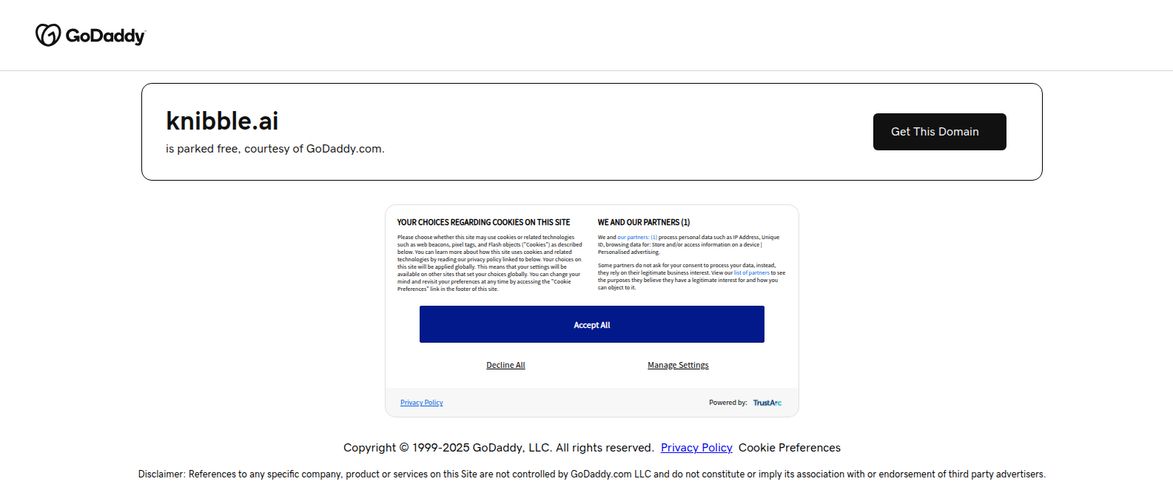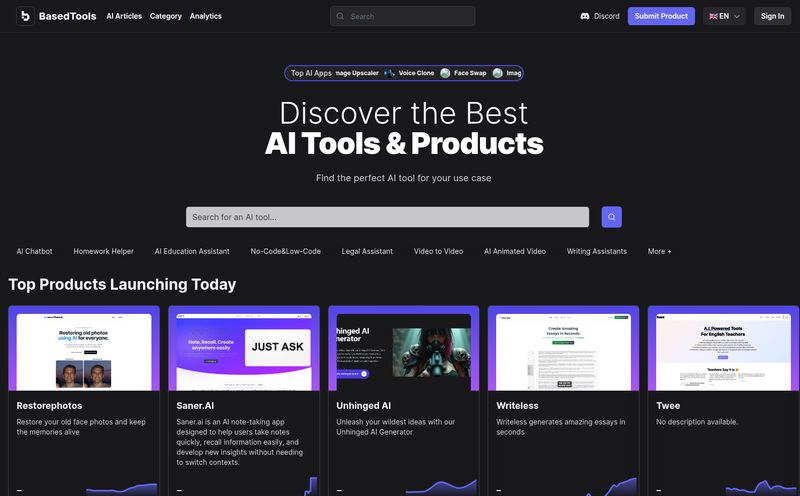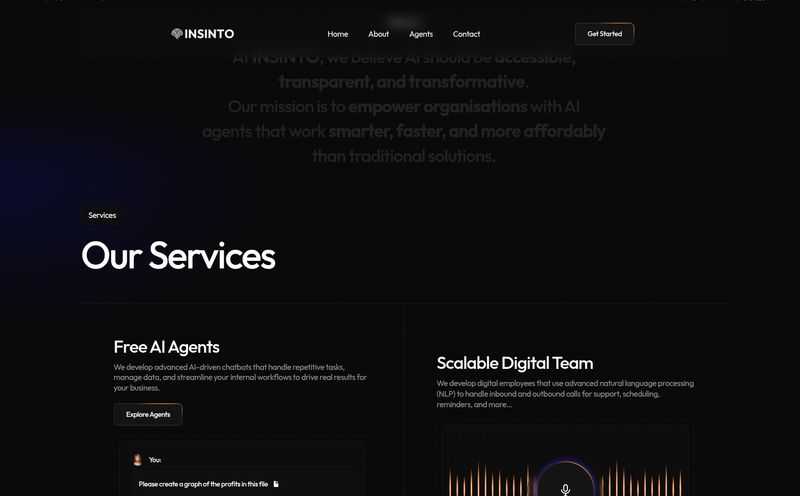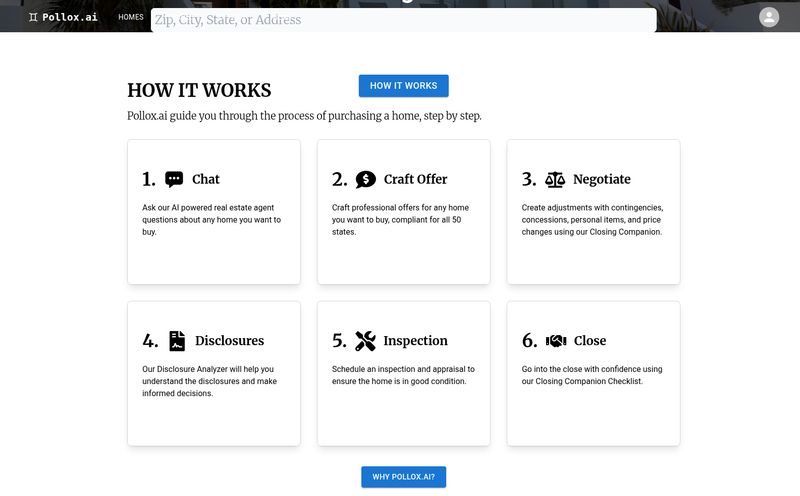How much of your workday is spent searching for things? Not profound, life-altering things. I’m talking about that one specific slide in a presentation from two years ago. Or the exact wording of a clause in a client contract buried somewhere in a shared drive. We've all been there, staring at a screen filled with a labyrinth of folders, trying to recall which Q3 2022 report contained that one specific statistic about user engagement.
It’s a pain. A real, genuine, soul-crushing pain. We're drowning in data, but we're starving for answers. The standard search bar, bless its heart, just doesn’t cut it anymore. It gives you a list of documents, not the single, concise answer you actually need. For years, the dream has been a system that just understands our stuff. And now, it feels like we're finally getting there. I've been kicking the tires on a platform called Visus.ai, and it’s one of the most promising stabs at this problem I've seen in a while.
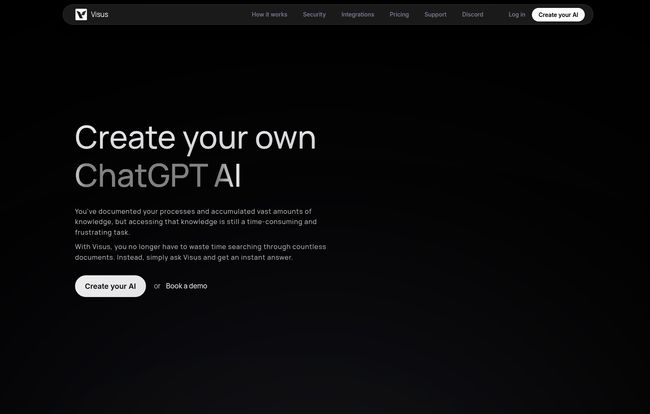
Visit Visus.ai
So, What on Earth is Visus.ai?
Alright, let's break it down without the usual marketing fluff. Let’s be honest, the term 'AI' gets thrown around more than a frisbee at a park these days. Visus.ai, at its core, lets you create your own, private version of ChatGPT. But here’s the kicker: instead of being trained on the entire, chaotic internet, it’s trained exclusively on your documents. Your files. Your knowledge base.
Think of it like this: You hire a brilliant, lightning-fast research assistant. You spend a bit of time giving them all your company’s reports, contracts, support wikis, and project plans. From that moment on, instead of you digging through the filing cabinets, you can just ask your assistant, "Hey, what was our revenue growth in the EMEA region last quarter?" and they give you the answer. Instantly. That’s Visus.ai. It’s a custom-built brain for your business's data.
How It Works: Training Your Digital Brain in 3 Simple Steps
The part that really caught my eye was the simplicity. I've messed with AI tools that required a degree in data science and a whole lot of patience to get running. Visus.ai seems to have sidestepped that whole mess. They've boiled it down to a three-step process.
Step 1: Feed the Beast (Your Documents, That Is)
First, you have to give your AI its education. You can upload documents directly—think PDFs, Word docs, you name it. Or, and this is where it gets really useful for teams, you can connect it directly to apps you're already using. Hook it up to your Google Drive, your Notion workspace, your Intercom help center. It ingests all that information and starts building its knowledge map. No more manual data entry. Hallelujah.
Step 2: Fine-Tuning Your AI’s Personality
This is the fun part. You’re not just stuck with a generic, robotic response. You can actually configure the AI’s parameters. You can tell it to be more creative or more factual (that's the 'temperature' setting for you fellow nerds). You can adjust its confidence level, telling it to only answer if it's really sure. You can essentially craft an AI personality that fits your company culture—whether you need a straight-laced legal bot or a more conversational marketing assistant.
Step 3: Just Ask. Seriously.
Once it's trained and configured, you just… talk to it. Open a chat interface and ask questions in plain English. No weird syntax or special commands. "Summarize the key findings from the latest user survey." "What are the main points of the Project Phoenix contract?" "Draft an email to a new client explaining our onboarding process based on our internal guide." It pulls the information from the documents you provided and gives you a synthesized answer, often with citations showing you exactly where it got the info. That citation part is huge for building trust.
Who Actually Needs This? Real-World Use Cases
Okay, it's cool tech, but who is it for? A few groups come to mind immediately.
- Customer Support Teams: Imagine a new support agent being able to ask an AI, "What's our policy on refunds for digital products?" and getting an instant, accurate answer pulled from the official knowledge base. It could slash training time and improve consistency.
- Sales Teams: They could quickly query battle cards, product specs, and case studies to answer tough client questions on the fly. "Pull up the three key differentiators between us and Competitor X."
- Legal and Compliance: Sifting through thousands of pages of contracts or regulatory documents becomes trivial. "Does this contract contain a non-compete clause? Show me the exact text."
- Agencies and Consultants: In my own agency, I can immediately see the value. We could create a separate AI instance for each client, train it on their brand guidelines, past campaigns, and performance reports. It'd be an incredible accelerator for strategy and content creation.
The Grown-Up Stuff: Security and Integrations
Whenever you're talking about uploading your company's private data to a platform, two questions should scream in your head: is it secure, and will it work with my other tools?
Is My Data Actually Secure?
Visus.ai makes some strong claims here. They talk about end-to-end encryption for data both in transit and at rest. This is standard procedure for any serious platform. More importantly, they emphasize that your data is yours. It's sandboxed and not used to train their main models or anyone else's AI. They also have strict permission enforcement, so you can control who on your team sees what. One thing to be aware of: their site mentions that SOC 2 compliance is still in progress. For larger enterprises, this might be a deal-breaker for now, but for most small to medium businesses, the existing security measures are probably sufficient. It's just something to keep an eye on.
Playing Nicely in Your Tech Sandbox
A tool is only as good as its ability to fit into your existing workflow. The list of integrations is solid: Google Drive, Slack, Microsoft Teams, Intercom, Notion. Being able to query your knowledge base directly from within Slack is a massive win for productivity. No more context switching. They also have a Chrome extension, so your little AI brain can follow you around the web. Smart.
The Big Question: What's This Going to Cost Me?
Alright, let's get down to brass tacks. Pricing is often the make-or-break factor. Visus.ai has a tiered structure that seems pretty logical.
There's a Free plan, which is pretty generous. You get one AI instance and 1,500 messages a month for a single user. This is perfect for a solopreneur or just for testing it out thoroughly without pulling out a credit card. I'm always a little skeptical of free plans but this one seems genuinely useful.
The Standard plan is $20 per member per month. This unlocks unlimited AI instances and messages for up to 10 team members. This feels like the sweet spot for most small teams and startups.
Then you have the Business plan at $50 per member per month. This adds more granular roles and permissions, the ability to create public-facing AI instances (like for a help bot on your website), and scales up to 100 members.
Finally, there's the Enterprise plan with custom pricing. This is for the big guns, offering things like custom fine-tuning, single sign-on (SAML), and that all-important (once it's finished) SOC 2 compliance.
The Honest Truth: The Good, The Bad, and The AI
No tool is perfect. After digging through their site and thinking about the practical application, here’s my balanced take.
On the plus side, the ease of training is a massive win. The promise of instant, accurate answers from your own ecosystem is the holy grail of knowledge management. The security framework seems solid (with that one caveat), and the integrations are well-thought-out. The ability to customize the AI's responses is more than just a gimmick; it’s crucial for brand alignment.
On the other side of the coin, there will be some initial setup. It’s not magic; you still have to gather and connect your knowledge sources. The pricing, while fair, can scale up quickly for larger teams on the Business plan. And as mentioned, the SOC 2 compliance being 'in progress' will be a yellow flag for some corporate security teams until it's officially checked off.
My Final Take: Is Visus.ai a Game-Changer or Just Hype?
So, what’s the verdict? I’m cautiously optimistic. Very optimistic, actually. Visus.ai isn't trying to be a magical solution to every problem. It's a focused tool that tackles one of the most persistent and annoying problems in modern business: finding the needle of information in the haystack of data we've created for ourselves.
It represents a shift from searching for documents to conversing with your collective knowledge. That’s a powerful change in perspective. Is it going to replace human expertise? No. But can it augment it, speed it up, and free up our brains to work on more important problems than finding a file? Absolutely. If you or your team feel the daily pain of information retrieval, I'd say spinning up a free account on Visus.ai is a no-brainer. It might just be the research assistant you've always wished you had.
Frequently Asked Questions About Visus.ai
- Can I really use Visus.ai for free?
- Yes, they have a Free plan that includes 1 AI instance, 1,500 messages per month, and is for one user. It's a great way to test the platform's capabilities with your own documents.
- How is this different from just using the regular ChatGPT?
- The key difference is the data source. ChatGPT is trained on a massive, general dataset from the internet. Visus.ai trains a private AI specifically on your documents. This means the answers are relevant to your business, private, and you can trust the source of the information.
- What kinds of documents can I upload to Visus.ai?
- The platform supports a wide range of file types, including common formats like PDF, DOCX, TXT, and others. You can also connect it to services like Google Drive and Notion to automatically sync your knowledge base.
- Is it difficult to set up my first AI?
- Based on their documentation, the process is designed to be straightforward. The main work is in gathering and connecting your data sources. The actual training and configuration within the Visus.ai platform appears to be user-friendly and doesn't require deep technical skills.
- Is my data used to train AI models for other companies?
- No. Visus.ai is very clear that your data is kept secure and isolated. It is only used to train your own private AI instances and is not shared or used to train their general models or any other client's AI.
- What are 'public AI instances' mentioned in the Business plan?
- This feature allows you to create a version of your trained AI that can be accessed by the public, for example, embedded as a customer support chatbot on your website. It can answer visitor questions based on the public-facing knowledge base you provide it.
Conclusion
In the constant race to work smarter, not harder, tools like Visus.ai are becoming less of a luxury and more of a necessity. The idea of transforming your chaotic digital filing cabinet into an intelligent, conversational database is incredibly compelling. While no platform is a silver bullet, Visus.ai makes a strong case for being a powerful ally in the fight against information overload. It’s definitely one to watch, and even better, one to try.
